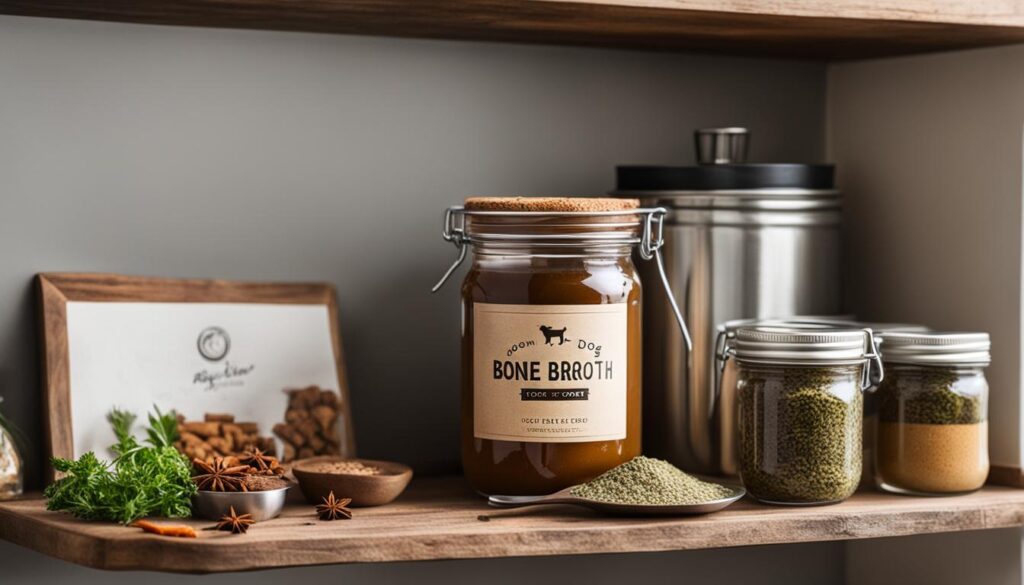Welcome to our guide on dog bone broth, where we explore the nutritional value and benefits of this homemade treat for your furry friend. If you’re looking to enhance your dog’s diet with a nutritious and flavorful addition, bone broth may be just what you need. Keep reading to discover the advantages of including bone broth in your dog’s mealtime routine and how to safely incorporate it into their diet.
Key Takeaways:
- Bone broth for dogs is highly beneficial, providing essential nutrients and promoting overall health.
- It supports joint health, aids digestion, boosts the immune system, and enhances skin and coat health.
- When serving bone broth to your dog, ensure it is free from harmful additives and prepared with quality ingredients.
- Different types of bone broth cater to various dietary needs and taste preferences.
- Homemade bone broth allows control over the ingredients and ensures quality and safety.
The Benefits of Bone Broth for Dogs
When it comes to promoting your dog’s overall health and well-being, bone broth can be a game-changer. This nutrient-packed elixir offers an array of benefits that can improve your furry friend’s gut health, joint health, immune system, skin and coat health, hydration, and even support the body’s natural detoxification process.

Bone broth improves gut health by promoting a healthy gut lining and aiding digestion. It contains gelatin, which helps to repair and seal the lining of the intestines, reducing inflammation and promoting a healthy digestive system. This can be particularly beneficial for dogs with sensitive stomachs or digestive issues.
Additionally, the natural compounds found in bone broth, such as glucosamine and chondroitin, contribute to promoting joint health and alleviating arthritis symptoms. These compounds help to reduce inflammation and support the health and flexibility of your dog’s joints, keeping them active and mobile for longer.
The collagen content in bone broth also plays a role in boosting your dog’s immune system and enhancing skin and coat health. Collagen helps to strengthen the skin’s barrier function, promoting healthy skin and a shiny coat. Furthermore, bone broth’s hydrating properties can aid in maintaining your dog’s overall hydration levels, especially during hot weather or after vigorous exercise.
Lastly, bone broth supports the body’s natural detoxification process. It contains glycine, an amino acid that helps remove toxins and supports the liver in eliminating waste from the body. By including bone broth in your dog’s diet, you can help support their overall detoxification and boost their overall health.
Is Bone Broth Safe for Dogs? How to Serve Bone Broth to Dogs?
Bone broth is a safe and nutritious addition to a dog’s diet when prepared correctly. It offers a range of health benefits for your furry friend, including improved digestion, joint health, and a boosted immune system. However, it’s essential to ensure that the bone broth you serve to your dog is free from harmful additives and prepared using high-quality ingredients.
When it comes to serving bone broth to your dog, there are a few considerations to keep in mind. The amount of bone broth you can give your dog depends on their size, health, and specific dietary needs. It’s best to consult with your veterinarian to determine the appropriate serving size for your pup. In general, bone broth can be served as a standalone treat or as a meal topper.
To serve bone broth to your dog, you can offer it chilled, at room temperature, or warmed. Some dogs may prefer it in a specific way, so it’s worth experimenting to see what your furry friend enjoys the most. Just make sure the bone broth is not too hot before serving.
Remember, it’s crucial to use homemade or high-quality commercial bone broth without added salt, onions, or other harmful ingredients. This ensures that your dog receives the full nutritional benefits without any potential risks. By providing bone broth to your dog in moderation and using safe ingredients, you can enhance their overall well-being and contribute to their optimal health.
Table: Guidelines for Serving Bone Broth to Dogs
| Dog Size | Amount of Bone Broth |
|---|---|
| Small (up to 20 lbs) | 1/4 to 1/2 cup per day |
| Medium (20-50 lbs) | 1/2 to 1 cup per day |
| Large (50-100 lbs) | 1 to 2 cups per day |
| Extra Large (100+ lbs) | 2 to 3 cups per day |
Remember to introduce bone broth gradually into your dog’s diet and monitor their response. If you notice any adverse reactions, such as gastrointestinal upset, discontinue the use of bone broth and consult with your veterinarian.
“Bone broth is a wonderful addition to a dog’s diet, providing essential nutrients and promoting overall health. Just make sure to prepare it safely and serve it in moderation, and you’ll be giving your furry friend a tasty and nutritious treat!”
So go ahead and incorporate bone broth into your dog’s mealtime routine. With its many benefits and the joy it brings to their taste buds, bone broth is sure to become a beloved part of their diet.
Different Types of Bone Broth for Dogs
When it comes to bone broth for dogs, there are several different types to choose from, each offering its own unique benefits and flavors. Let’s take a closer look at four popular varieties: beef bone broth, chicken bone broth, turkey bone broth, and fish bone broth.
Beef Bone Broth
Beef bone broth is a hearty and nutrient-rich option for dogs. It is made by simmering beef bones for an extended period, extracting valuable minerals, collagen, and amino acids. This type of bone broth is known for its robust flavor, making it a great choice for dogs who enjoy bold tastes.
Chicken Bone Broth
Chicken bone broth has a milder taste compared to beef bone broth, making it ideal for dogs with sensitivities or those who prefer a lighter flavor. It is made by simmering chicken carcasses or bones, resulting in a broth that is packed with protein and essential nutrients.
Turkey Bone Broth
Turkey bone broth offers a leaner option for dogs, making it perfect for those on low-fat diets. It is made by simmering turkey bones and can be a nutritious addition to a dog’s diet. This type of bone broth provides a great source of protein and essential amino acids.
Fish Bone Broth
Fish bone broth is an excellent choice for dogs who can tolerate seafood. It is made by simmering fish bones, such as salmon or whitefish, and offers the benefits of omega-3 fatty acids. This type of bone broth can help support healthy skin and coat, making it a popular choice for dogs with allergies or skin issues.
| Type of Bone Broth | Flavor | Benefits |
|---|---|---|
| Beef Bone Broth | Robust | Rich in minerals, collagen, and amino acids |
| Chicken Bone Broth | Mild | High in protein and essential nutrients |
| Turkey Bone Broth | Lean | A nutritious source of protein and amino acids |
| Fish Bone Broth | Varies (depending on the fish) | Provides omega-3 fatty acids for skin and coat health |
Each type of bone broth offers its own set of benefits and can be a valuable addition to a dog’s diet. Whether you’re looking for a rich and hearty broth like beef bone broth or a lighter option like chicken bone broth, there’s a variety to suit every pup’s taste and nutritional needs.
What Ingredients to Avoid in Bone Broth for Dogs?
When it comes to giving your furry friend the best nutrition, it’s important to be aware of what ingredients to avoid in bone broth for dogs. While bone broth is generally a healthy and beneficial addition to a dog’s diet, there are certain harmful ingredients that pet owners should steer clear of.
First and foremost, it’s essential to avoid bone broth powders or dehydrated bone broth products. These convenience options may lack the necessary nutrients and quality found in homemade or high-quality commercial bone broth. Opting for real bones and slow simmering ensures that your dog receives all the nutritional benefits.
Additionally, it’s crucial to check the ingredient list and avoid bone broth products that contain onions, excessive salt, artificial additives, or preservatives. These ingredients can be harmful to dogs and may cause digestive issues or other health problems. Stick to all-natural, high-quality bone broth made from real bones, without any unnecessary additives.
“Giving your dog bone broth provides numerous health benefits, but it’s important to choose the right ingredients. Avoid bone broth powders, dehydrated options, and products with harmful additives. Stick to homemade or high-quality commercial bone broth made from real bones and without any onion, salt, or artificial ingredients.”
By being mindful of these ingredients and opting for safe and nutritious bone broth choices, you can ensure that your dog reaps all the benefits without any potential harm. Remember, the quality of the ingredients directly impacts the quality of the bone broth and its impact on your furry friend’s health.
Now that you know what ingredients to avoid, let’s take a closer look at how you can make homemade bone broth for your dog.
Table: Harmful Ingredients to Avoid in Bone Broth for Dogs
| Ingredient | Potential Harm |
|---|---|
| Bone broth powders or dehydrated bone broth | Lack of necessary nutrients found in homemade or high-quality bone broth |
| Onions | Can cause digestive issues and potential toxicity |
| Excessive salt | Can lead to dehydration and electrolyte imbalance |
| Artificial additives or preservatives | Potential for allergic reactions and negative health effects |

Is Homemade Bone Broth Safe for Dogs? How to Make Bone Broth at Home for Dogs?
Homemade bone broth is not only safe but highly beneficial for dogs when prepared correctly. By making bone broth at home, you have control over the ingredients, ensuring a high-quality and nutritious product for your furry friend. Here’s a step-by-step guide on how to make bone broth at home for dogs:
Ingredients:
- Raw bones (beef bones or chicken carcass)
- Vegetables (carrots, celery)
- Water
- Optional ingredients (apple cider vinegar, parsley)
To start, place the raw bones and vegetables in a large pot. Add enough water to cover the ingredients completely. If desired, you can add a splash of apple cider vinegar, which helps extract nutrients from the bones. Bring the mixture to a boil, then reduce the heat to low and simmer for 12-24 hours. This slow simmering process allows the bones to release their nutrients into the broth.
Once the broth has simmered for the desired time, remove it from the heat and let it cool. Strain the broth to remove any bone fragments or vegetable remnants. It’s important to let the broth cool completely before serving it to your dog. You can refrigerate it for a few hours or overnight to speed up the cooling process.
Once the bone broth has cooled, it’s ready to be served to your dog. You can give it to them as a standalone treat or meal topper. Some dogs enjoy the broth chilled, while others prefer it at room temperature or warmed. It’s a versatile addition to their diet that can be adjusted to meet their preferences.

Benefits of Homemade Bone Broth for Dogs:
| Benefit | Description |
|---|---|
| Promotes joint health | The collagen and natural compounds in bone broth support healthy joints, reducing the risk of arthritis and alleviating joint pain. |
| Supports digestion | The gelatin and amino acids in bone broth aid digestion, soothe the digestive system, and promote a healthy gut. |
| Boosts the immune system | The collagen and nutrients in bone broth strengthen the immune system, helping your dog stay healthy and ward off illnesses. |
| Enhances skin and coat health | The collagen and amino acids in bone broth promote healthy skin and a shiny coat, reducing dryness and improving overall appearance. |
| Provides hydration | As a liquid, bone broth is a great source of hydration for dogs, especially on hot days or for dogs who don’t drink enough water. |
By incorporating homemade bone broth into your dog’s diet, you can provide them with a nutritious and flavorful addition that offers numerous health benefits. Remember to introduce it gradually into their diet, monitor their response, and consult with your veterinarian if you have any concerns.
How to Store Bone Broth for Dogs?
Properly storing bone broth for dogs is essential to maintain its freshness and nutritional value. Follow these guidelines to ensure your dog’s bone broth stays safe and delicious for future use.
Short-Term Storage
If you plan to use the bone broth within a few days, store it in an airtight container in the refrigerator. This will help maintain its flavor and prevent any potential bacterial growth. Remember to label the container with the date to keep track of its freshness. Bone broth can be safely stored in the refrigerator for 3-4 days.
Long-Term Storage
If you want to store bone broth for a longer period, freezing is the best option. You can pour the bone broth into ice cube trays for convenient portioning or use larger containers if you need larger servings. Make sure the containers are freezer-safe, airtight, and properly labeled. Frozen bone broth can be stored for up to a year without significantly losing its nutritional value.
To use frozen bone broth, simply thaw it in the refrigerator overnight or briefly warm it on the stovetop. It’s important to thoroughly heat the bone broth before serving it to your dog to ensure any potential bacteria are eliminated.
| Storage Method | Duration | Notes |
|---|---|---|
| Refrigerator | 3-4 days | Store in an airtight container |
| Freezer | Up to 1 year | Use freezer-safe, airtight containers |
By following these storage guidelines, you can ensure that your dog’s bone broth remains fresh and retains its nutritional benefits. Whether you choose short-term refrigeration or long-term freezing, your furry friend will continue to enjoy the health benefits of this nourishing treat.

“Proper storage of bone broth is crucial to maintain its freshness and nutritional value for your dog. Whether you’re using it as a treat or a meal topper, following the storage guidelines will ensure your dog gets the most out of this nutritious addition to their diet.”
– Dr. Sarah Thompson, Canine Nutrition Expert
Conclusion
So, there you have it – the incredible benefits of homemade dog bone broth. By incorporating this nutrient-rich superfood into your furry friend’s diet, you are providing them with a delicious and wholesome treat that can improve their overall well-being. The nutritional value of bone broth for dogs cannot be overlooked.
Not only does bone broth provide essential nutrients, but it also promotes joint health, aids digestion, boosts the immune system, enhances skin and coat health, and supports detoxification. It’s truly a powerhouse of goodness that can make a significant difference in your dog’s health.
By making bone broth at home, you have complete control over the ingredients, ensuring that your furry friend receives only the best. So, gather those raw bones, vegetables, and simmer away to create a homemade bone broth that your dog will absolutely love. Give them the nutritional boost they deserve with the goodness of bone broth.
FAQ
What are the benefits of bone broth for dogs?
Bone broth for dogs provides essential nutrients, promotes joint health, aids digestion, boosts the immune system, enhances skin and coat health, aids hydration, and supports the body’s natural detoxification process.
Is bone broth safe for dogs? How should I serve bone broth to my dog?
Yes, bone broth is safe for dogs to consume daily. You can serve bone broth to your dog as a standalone treat or meal topper, either chilled, at room temperature, or warmed. The amount of bone broth to give to your dog depends on their size, health, and specific dietary needs.
What types of bone broth are available for dogs?
There are different types of bone broth available for dogs. Beef bone broth is rich in nutrients and has a robust flavor. Chicken bone broth has a milder taste and is ideal for dogs with sensitivities. Turkey bone broth offers a leaner alternative, and fish bone broth provides omega-3 fatty acids for skin and coat health.
What ingredients should I avoid in bone broth for dogs?
It is important to avoid bone broth products that contain harmful ingredients such as added salt, onions, excessive salt, artificial additives, or preservatives. Natural, high-quality bone broth made from real bones is recommended.
Is homemade bone broth safe for dogs? How can I make bone broth at home for my dog?
Yes, homemade bone broth is safe and highly beneficial for dogs when prepared correctly. To make bone broth at home for your dog, you will need raw bones (such as beef bones or chicken carcass), vegetables like carrots and celery, water, and optional ingredients like apple cider vinegar and parsley. The bones and vegetables are simmered for 12-24 hours, then strained and served to your dog.
How should I store bone broth for dogs?
Bone broth for dogs can be stored in the refrigerator for 3-4 days in an airtight container. For longer storage, it can be frozen in ice cube trays or larger containers for up to a year. Label containers with the date to monitor freshness, and be sure to reheat thoroughly before serving. Leftovers should be discarded.





